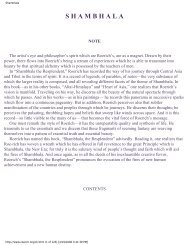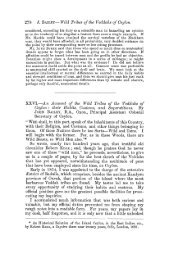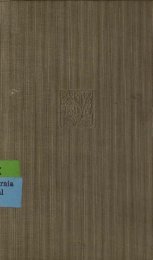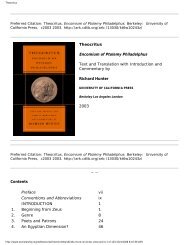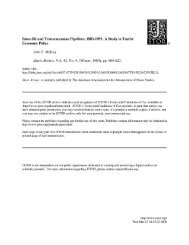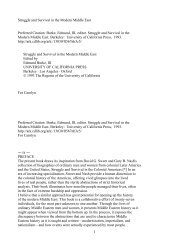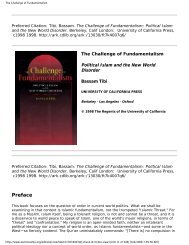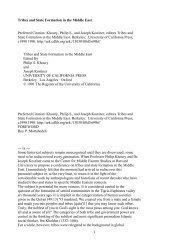Between Two Worlds Kafadar.pdf
Between Two Worlds Kafadar.pdf
Between Two Worlds Kafadar.pdf
Create successful ePaper yourself
Turn your PDF publications into a flip-book with our unique Google optimized e-Paper software.
not, it is not surprising that the narrators of those particular texts would<br />
choose to censor episodes concerning dynastic strife resolved through murder in<br />
the family (deflected parricide?). To sustain the logic of their argument, or<br />
the moral of their tale, Apz, Uruç, and the compilers of the anonymous<br />
chronicles would simply need to omit Dündar's case, because their narratives are<br />
structured around a rupture in the moral uprightness of the Ottoman enterprise<br />
in the reign of Bayezid I (1389-1402): all evil deviations from the purity and<br />
sincerity of early frontier years are to be located after that juncture, all<br />
those nasty developments toward the construction of an imperial political system<br />
and its ideology. The case is the same with fratricide, which the anonymous<br />
chroniclers and Uruç explicitly cite as an evil that was not practiced, so they<br />
claim, in the early generations. Just after reporting Orhan's peaceful agreement<br />
with his brother `Ala'eddin upon their father's death, these sources add:<br />
"brothers consulted each other then; they did not kill one another."[126]<br />
Curiously, this passage is omitted in the YF-Apz narrative, which also omits<br />
reports, found in some other chronicles, about the murder of Haci Ilbegi , to be<br />
discussed below. It is unlikely that Yahsi Fakih had not heard these gruesome<br />
stories, whether they were true or not. He may have found them unbelievable or<br />
chosen not to write them down, or perhaps Apz excluded such passages from his<br />
edition.[127] It must have been Apz's choice, for instance, to omit the<br />
antifratricide editorial recorded in the anonymous chronicles and Uruç, because<br />
it is presumably from the common source. Did Apz omit this passage because he<br />
knew better, namely, because he had read about Osman and Dündar in the menakib<br />
of Yahsi Fakih ? In any case, the anonymous chroniclers and Uruç are in general<br />
more consistent in erasing all memory of familial strife in the early<br />
generations before Bayezid . They also omit the passage, related by Apz and<br />
preserved by Nesri , of Osman's disagreement with his brother Gündüz. Uruç is in<br />
fact so cautious that he makes Osman's two brothers die before Ertogril's<br />
demise, that is, before Osman has any political claims, so that he cannot be<br />
imputed.[128] In the anonymous texts, the brothers are named but nothing is said<br />
of their deaths.<br />
As for Dündar, he is mentioned before Nesri only in Bayath Mahmudogli Hasan's<br />
Cami Cem-Ayin .[129] Bayath writes that Ertogril's father had four sons: two of<br />
them took their clans eastward when their father drowned in the Euphrates; the<br />
other two, Ertogril and Dündar, came to<br />
― 107 ―<br />
Anatolia. Dündar is not mentioned again in this work, which leaves some room for<br />
speculation but no more than that. How could that vile deed be imputed to the<br />
glorious founding father in a work written for Prince Cem, the loser of a<br />
violent struggle for the throne and the prime target of fratricidal designs<br />
entertained by the victorious brother? Apz, Uruç, and the authors of the<br />
anonymous chronicles as well as Ahmedi assign only three sons to Ertogril's<br />
father; none of them is named Dündar. (Sukrullah and Karamanli Mehmed simply do<br />
not refer to any brother of Ertogril .<br />
Is it coincidental that the policy defended by Dündar is the very one Ertogril<br />
is claimed in some sources to have maintained during his chieftainship? A<br />
95




